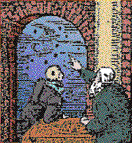The course of true love?
The centre of the plot is rather like a Roman comedy--with romantic trimmings. There are two young lovers, hindered in their love by the crusty old man, the senex*, and they plot to escape his tyranny.
But the second plot, the misdirected love of Demetrius and Helena, and the whole invention of a love-juice, is wholly new, and much more in the tradition of romantic comedy. Even in this one plot, Shakespeare has created different layers--Roman and romantic--in the recipe for comedy.
Like the lesser plot of Theseus and Hippolyta, the situation and character of the lovers draws attention to the traditional relationship between the sexes*.
Footnotes
-
Senex
Latin for "old man." Click on the link "Roman comedy" for more.
-
Gender and power issues
- Egeus claims absolute control over his daughter; would an
Elizabethan audience have agreed?
-
(Click on the link "Fathers and daughters" for more).
- The relationship of Hermia and Lysander seems relatively
well-balanced, but what of Helena's submission to Demetrius:
"Use me but as your spaniel, spurn me, strike me . . ."
(2.1.205)?
-
(Click for more)
- Egeus claims absolute control over his daughter; would an
Elizabethan audience have agreed?
